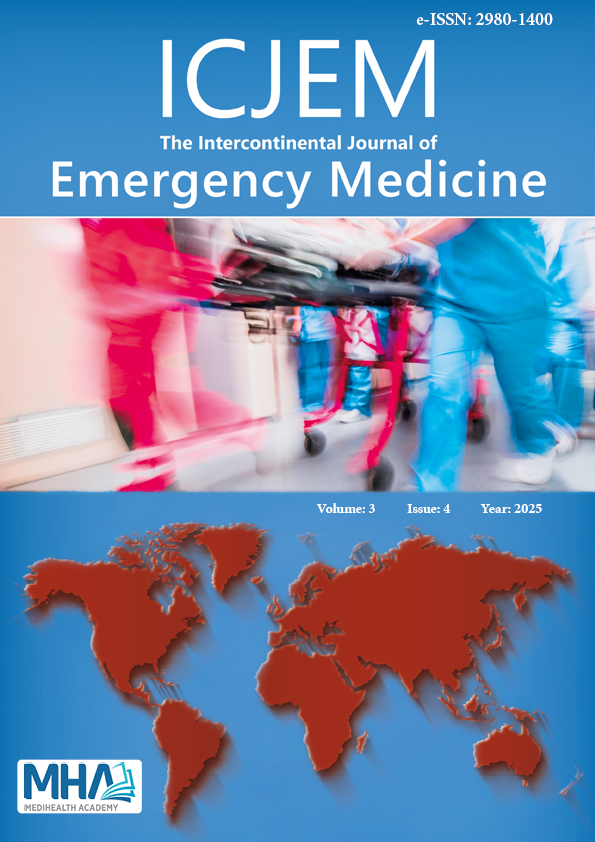1. Beştemir A, Aydın H. Yıllık 300 milyon hasta muayenesi; Türkiye'de 2. ve 3. basamak kamu sağlık tesisleri acil servis ve poliklinik hizmetlerinin değerlendirilmesi. Sakarya Tıp Derg. 2022;12(3):496-502.
2. Aygün A, Karabacak V, Işık HS. Acil servis hekimlerinin tibbi hukuki sorumluluklari hakkinda bilgi, tutum ve davranişlari. Kırıkkale Üni Tıp Fak Derg. 2018;20(3):321-328.
3. Jena AB, Seabury S, Lakdawalla D, Chandra A. Malpractice risk according to physician specialty. New England J Med. 2011;365(7):629-636.
4. Ferguson B, Geralds J, Petrey J, Huecker M. Malpractice in emergency medicine-a review of risk and mitigation practices for the emergency medicine provider. J Emerg Med. 2018;55(5):659-665.
5. Bookman K, Zane RD. Surviving a medical malpractice lawsuit. emergency medicine clinics of North America. 2020;38(2):539-548.
6. Al-Jabri F, Kvist T, Sund R, Turunen H. Quality of care and patient safety at healthcare institutions in Oman: quantitative study of the perspectives of patients and healthcare professionals. BMC Health Serv Res. 2021;21(1):1109.
7. AlBalushi AA, Al-Asmi A, Al-Shekaili W, et al. Medical malpractice in Oman: a 12-year retrospective record review. PLoS One. 2023;18(8):e0290349.
8. Parker M, Willmott L, White B, Williams G, Cartwright C. Law as clinical evidence: a new constitutivemodel of medical education and decision-making. J Bioeth Inq. 2018;15(1):101-109.
9. Yıldırım A, Aksu M, Çetin İ, Şahan A. Tokat ili merkezinde çalışan hekimlerin tıbbi uygulama hataları ile ilgili bilgi, tutum ve davranışları. Cumhuriyet Med J. 2009;31(4):356-366.
10. Bilge A, Çalışkan F, Sezik S, Aksay E. A national survey of turkish emergency residents perspectives regarding interventional skills. Turkish J Emerg Med. 2012;12(1):103-111.
11. Arvier PT, Walker JH, McDonagh T. Training emergency medicine doctors for rural and regional Australia: can we learn from other countries? Rural Remote Health. 2007;7(2):705.
12. Başer A, Kolcu G, Çığırgil Y, Kadınkız B, Öngel K. İzmir Karşıyaka ilçesinde görev yapan aile hekimlerinin defansif tıp uygulamaları ile ilgili görüşlerinin değerlendirilmesi. Smyrna Tıp Dergisi. 2014;16:24.
13. Hiyama T, Yoshihara M, Tanaka S, et al. Defensive medicine practices among gastroenterologists in Japan. World J Gastroenterol. 2006;12(47):7671-7675.
14. Plaiasu MC, Alexandru DO, Nanu CA. Physicians' legal knowledge of informed consent and confidentiality. A cross-sectional study. BMC Med Ethics. 2022;23(1):93.
15. Skiba R, Sikotra N, Wilson A, Clay TD, Gabbay E. Doctors' understanding of consent law. Intern Med J. 2021;51(7):1068-1073.
16. Tintinalli JE, Shofer F, Biese K, Phipps J, Rabinovich S. Toward a new paradigm: goal-based residency training. Acad Emerg Med. 2011;18(Suppl 2):S71-78.
17. Singer A, Hobgood C, Kilroy D, et al. International federation for emergency medicine model curriculum for medical student education in emergency medicine. Cjem. 2009;11(4):349-54.
18. Balseven Odabaşı A, AR T. Bir grup hekimin yeni Türk Ceza Kanunu ile ilgili değerlendirmeleri. Bulletin Legal Med. 2008;13(2):49-56.

